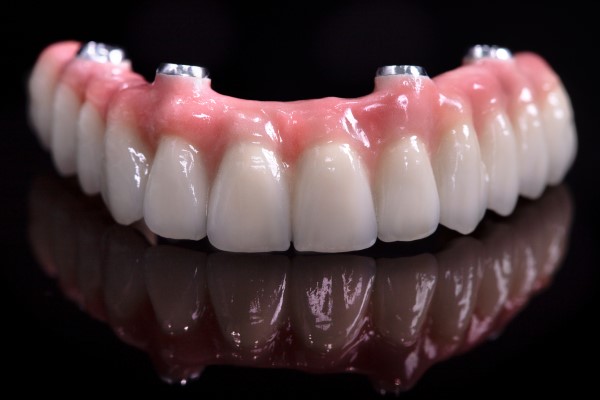3 Benefits of Implant Supported Dentures

One option for someone who is missing teeth is implant supported dentures. It is important to fill in gaps in the mouth; not doing so has a variety of unwanted consequences. In the short term, a missing tooth often leads to pain, as the nearby teeth will start to shift. In addition, these teeth are now compensating for the missing one by taking on excess pressure and force. This can lead to discomfort.
Over time, those teeth are more likely to experience serious damage because of the extra wear and tear. Chips, cracks, and breaks are more probable for these surrounding teeth. Missing teeth can also impact major functions of the body. Speech is the most obvious one, and trouble pronouncing words correctly can be embarrassing. Without a full set of teeth, you are more likely to experience digestive issues as well. Every tooth plays an important role in chewing food and preparing it for efficient digestion.
When a permanent tooth is lost, other teeth will likely go out of proper alignment. This can cause issues with bite formation, an increased risk for tooth decay, and even jaw pain and headaches. Last but not least, missing teeth can hurt a person's self-esteem and prevent them from fully engaging with others in social situations.
There are numerous replacement options for missing or severely damaged teeth. Traditional dentures tend to be affordable, but they often slip around and do not provide much stability. Implants, on the other hand, have numerous benefits, but they are more expensive. Implant supported dentures offer an in-between solution.
Implant-supported denture procedure
With this type of denture, titanium rods (the implants) are inserted directly into the jawbone, and posts are attached to the top of the implants. A full set of dentures is then attached to the posts.
Benefits
Because implant-supported dentures are affixed to the jaw, there are a variety of benefits when compared to other denture options.
1. Prevent bone loss
When missing teeth are not replaced, the jawbone begins to lose some of its density, and it gets worse over time. Traditional dentures do not provide the support necessary to prevent this loss. Once the bone begins to deteriorate, biting and chewing become more difficult.
The implants, however, allow the jawbone to integrate and grow around them. The full biting force of the dentures continues to put pressure on the bone, which prevents its loss. This in turn helps patients avoid the unnecessary bone loss that leads to weakness, an increased risk of damage, and unwanted changes in facial shape.
Another benefit of retaining the jawbone is that it prevents a change in facial appearance. When there is bone loss, the facial muscles begin to collapse, which can result in sunken cheeks and a saggy jaw. Implant-supported dentures allow people to keep a normal appearance.
2. Provide stability
The implants also provide stability that most other replacement options do not. The implant-supported dentures allow for complete biting force, which means that most foods can be chewed just like they would with normal teeth. Many foods that would otherwise be off-limits, such as corn on the cob, steak, and sticky foods, can be enjoyed with this type of dentures.
Improved stability also means that the wearer can speak confidently. The dentures do not slip, which means that there is no interference with the way the person pronounces certain sounds and words. Because they do not slip, the individual also does not develop sores in the mouth.
3. Increase confidence
The ability to chew and speak like normal is extremely comforting to someone who wears implant-supported dentures. Having a full mouth of teeth again also feels good, and it makes it easier to smile. The dentures are easy to care for, as they are brushed and flossed just like natural teeth. This improves self-esteem in that it makes it easier for the person to forget he or she is even wearing dentures.
Conclusion
No matter what the cause, it is important to replace any and all missing teeth to avoid serious and harmful complications. Implant-supported dentures are one method for obtaining a full mouth of teeth. While the dentures may need replacement every 10 to 15 years (as with traditional dentures), the implants are designed to last a patient a lifetime. The stability and appearance they provide are advantageous in many ways, and they may be a good option for the right candidate.
Request an appointment here: https://frankforddentalcare.com or call Frankford Dental Care at (215) 302-1746 for an appointment in our Philadelphia office.
Check out what others are saying about our dental services on Yelp: Implant Supported Dentures in Philadelphia, PA.
Recent Posts
If you are missing teeth, you may assume that your only options are receiving implants or dentures from your dentist. A recent option to replace missing teeth is a combination of the two strategies: implant-supported dentures.There are some situations in which traditional dentures are better and others in which the implant-supported variety would provide greater…
The implant-supported dentures process can take anywhere from six months to a year to complete. The time it takes to get implant-supported dentures depends on a variety of factors and is unique for every patient. During the first visit with a dentist (the consultation), they can provide a tentative timeline for how long the process…
Considering implant supported dentures? This treatment is one that has grown in popularity as it offers a hybrid approach to replacing entire arches of missing teeth. Combining dental implant placement with conventional dentures, patients are able to successfully replace teeth that have been lost to decay. One question that often arises when considering tooth replacement…
You may have heard of the classic traditional dentures, but you may not realize that there are other, more stable options out there, like implant supported dentures. While conventional dentures rely on the gums and mouth muscles for support, implant supported dentures (as their name suggests) are attached to and supported by implants in the…


